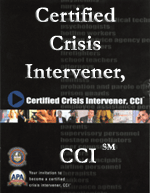The American Psychotherapy Association in collaboration with the American Board of Examiners in Crisis Intervention is proud to announce the Certified Crisis Intervener Certification Program and the Certified Crisis Intervener, CCI designation.
The Certified Crisis Intervener designation is an advanced credential that recognizes additional training and expertise in crisis intervention and management. The CCI designation provides a mechanism for specialization in this critical area through basic, intermediate and advanced training in Crisis Intervention.
E-mail: [email protected] or call toll free 800-205-9165 for your free informational brochure.
![]()
Three Voices on the Evolution of Health Care: Unifying Mind, Body & Spirit, August 22-24, 2025 San Antonio, Texas
| Featuring: |
William Glasser, M.D.
|
Ernest Rossi, Ph.D.
|
Bill O’Hanlon, M.S.
|

Earn up to 16 Continuing Education Credits
*Featured presentations are in addition to the general sessions.
Entire conference program now available. Click here to review a complete listing of the course descriptions.
For complete information contact:
The American Psychotherapy Association
2750 E. Sunshine
Springfield, MO 65804
Tel: 800-205-9165
Fax: 417-823-9959
By Bruce Gross, Ph.D., J.D., M.B.A., DAPA
The liability of a mental health practitioner to her client is legally determined by the nature of the relationship between the two. When the therapist is paid by or on behalf of the client to use her specialized skills and knowledge to the benefit of the client, it is legally defined as a fiduciary relationship. In this relationship, the therapist has a duty to not allow any conflict of interest to compromise her responsibility to the client and to provide a high standard of care; simply stated, therapists have a legal duty not to harm their clients. When a practitioner by intentional or unintentional acts or omissions fails in that duty, they have committed a tort, or a wrong.
![]()





